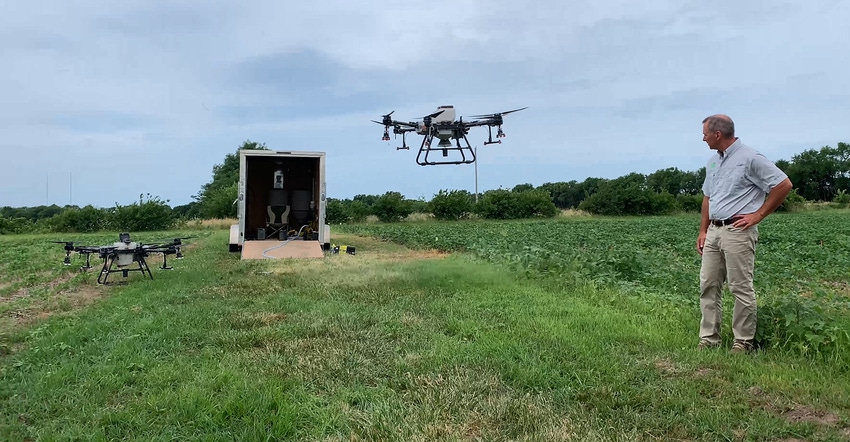
It is not often University of Missouri Extension weed scientist Kevin Bradley invites someone outside of the system to speak at a field day, but during this year’s MU Pest Management Field Day, he asked Agri Spray Drones founder Taylor Moreland to speak.
“I believe this man standing right next to me is the expert, not only in the state of Missouri, but pretty much the Midwest and maybe even beyond,” Bradley told attendees. “I don’t think I’ve ever had a crowd ask him a question that he can’t answer.”
Moreland did not make a sales pitch, but he offered education and technical expertise on how to use drones for aerial chemical applications, as well as cover crop seeding. He not only demonstrated how to fly drones, but also explained the hardware and software that operates the drone.
Hear his explanation of both by clicking on the video below:
Bringing drone tech to Midwest
Raised on a farm, Moreland has worked with farmers his entire life. So when he started testing sprayer drone technology in 2019, he kept the farmer in mind. Much like many universities, Moreland tests the drones to ensure they perform as promised.
Agri Spray Drones, based in Centralia, Mo., sells drones and uses heavy drones for custom work. Farmers can use drones for aerial applications, such as fungicides, to their entire crop throughout the season and even spread cover crops. The company works with row crops, as well as orchards.
Moreland is a drone tech teacher helping others troubleshoot problems with their own drones. He also provides a service to help customers create new drone custom application businesses to serve local farming communities.
Potential of drones in farming
Moreland believes the next move for drones will be size — think large. His company will have a 10½-gallon unit next year, but it comes with a caveat.
“I don't see it being much more efficient for square fields — quarter-mile long, half-mile long — just because the tank size and swath width ratio,” he explained. “But it would definitely have use for odd-shaped fields.”
Moreland notes there will need to be some software and hardware upgrades for these larger models before hitting the fields. However, technology is advancing with smaller drones to allow for automated spot spraying.
“It's just the software, computing power and recognition of weeds with that imagery and the camera capabilities that are limiting that from being a full, automated streamlined process,” he added. “But it's coming.”
For more information on Agri Spray Drones, visit agrispraydrones.com.
About the Author(s)
You May Also Like






